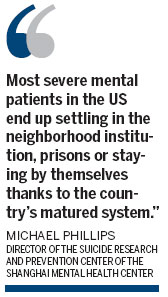Mental-health patients given OK to leave 'have nowhere to go'
Updated: 2013-05-07 08:11
By Shi Yingying in Shanghai (China Daily)
|
||||||||

Although a new law allows eligible mental-health patients to be discharged from a hospital when they want to leave, 52 patients at a Shanghai psychiatric hospital still find it difficult to go home.
The new law on mental health, which took effect on Wednesday, grants patients the right to request to be discharged once they qualify for this.
Encouraged by the news, 70 patients at Shanghai Pudong Mental Health Center - a district-level hospital - made the request and passed a medical assessment, the center said.
However, family members of 52 patients out of the 70 people declined to sign the discharge orders and take the patients home, the hospital said.
"People haven't heard such things before, as it was up to the patient's family whether the patient goes home or stays in the hospital. But now, they (patients) can make the request themselves," a doctor at the hospital who would not reveal his name told China Daily over the phone on Monday.
Chen Dinghua, director of the center, said most of the "homeless" patients were admitted involuntarily. They were sent to the center by their families or the police, and some of them have been in the hospital for more than 10 years.
"Some of our patients' apartments have been sold or rented out by their guardians, and their pensions have also been taken. They've got nowhere to go," said Chen, referring to these 52 patients, of which the majority has recovered from illness with a few being in stable condition as long as they take medicine on time.
None of the patients or their family members were available for comment on Monday.
Xu Yifeng, president of the Shanghai Mental Health Center, another psychiatric hospital, said that without the agreement of family members, it's difficult for patients to leave the hospital because they have nowhere to go.
"We had similar cases before, and have repeatedly called their families, but most were in vain," he said.
Tian Chenghua, a doctor with Peking University Sixth Hospital, a well-known mental-health hospital in Beijing, said examples of families abandoning mental-health patients are common across the country.
"For a big hospital with 800 beds, about 100 patients were abandoned by their families," he said. "Ten to 12.5 percent of patients are being left in institutions in Beijing."
To help the 52 patients go home, six lawyers have been assigned to the Pudong Mental Health Center to provide legal support. However, according to Huang Xuetao, a lawyer in Guangzhou who specializes in cases involving mental health, suing irresponsible guardians is not the solution.
"How could the judge deliver a verdict to pass the patients to their hostile custodians?" Huang said. She called for social support from the public on the mental-health issue and insisted it's not only about "the call from doctors or the law".
Noch Li, a resident of Hong Kong who has had severe depression since November 2009, also called for more understanding of mental-health patients and better communication with them.
"I can understand how it would create difficulty, for it seems that on the Chinese mainland, there is still a strong taboo against people with mental-health challenges. Therefore, the family might feel ashamed to take them back," she said.
"I think the law creates the rights for the patients, which is important, as the patient could decide if and what kind of treatment to undergo. This is fundamental, as not every patient might feel comfortable with the same treatment method."
However, she said the drawback in any law is that it cannot mandate communication between anyone.
"In many cases, family members might not understand the illness, or even do not want to know about it as it is a source of shame. Therefore, there is no communication between the one who needs medical attention and his or her friends and family."
"The mis- or non-communication, with or without a law, would affect how the patient is viewed or how he or she is stigmatized," she said.
Michael Phillips, director of the Suicide Research and Prevention Center of the Shanghai Mental Health Center, also said the families of mental-health patients face challenges.
He said that about 90 percent of those with severe mental illness in China stay in a hospital or with their families, but the figure is 20 to 50 percent in developed countries such as the United States and Canada.
"Most severe mental patients in the US end up settling in the neighborhood institution, prisons or staying by themselves thanks to the country's matured system," he said.
"It still remains unknown whether the new mental health law, which took 27 years in China to form, will push the country's figure near the US'."
Wang Hongyi contributed to this story.
shiyingying@chinadaily.com.cn
(China Daily 05/07/2013 page3)

 Michelle lays roses at site along Berlin Wall
Michelle lays roses at site along Berlin Wall
 Historic space lecture in Tiangong-1 commences
Historic space lecture in Tiangong-1 commences
 'Sopranos' Star James Gandolfini dead at 51
'Sopranos' Star James Gandolfini dead at 51
 UN: Number of refugees hits 18-year high
UN: Number of refugees hits 18-year high
 Slide: Jet exercises from aircraft carrier
Slide: Jet exercises from aircraft carrier
 Talks establish fishery hotline
Talks establish fishery hotline
 Foreign buyers eye Chinese drones
Foreign buyers eye Chinese drones
 UN chief hails China's peacekeepers
UN chief hails China's peacekeepers
Most Viewed
Editor's Picks

|

|

|

|

|

|
Today's Top News
Shenzhou X astronaut gives lecture today
US told to reassess duties on Chinese paper
Chinese seek greater share of satellite market
Russia rejects Obama's nuke cut proposal
US immigration bill sees Senate breakthrough
Brazilian cities revoke fare hikes
Moody's warns on China's local govt debt
Air quality in major cities drops in May
US Weekly

|

|







